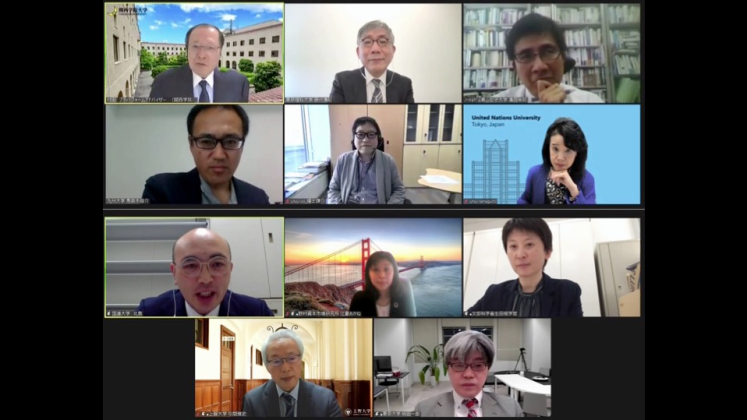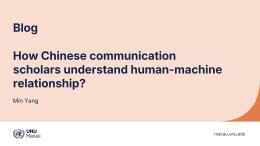UNU-IAS organised the sixth workshop for the UNU SDG–University Platform (SDG-UP) on 24 March 2021, through videoconferencing. There were 84 participants from 27 universities across Japan, as well as representatives from the private sector and media. The workshops for UNU SDG-UP started in October 2020 and this was the last one for this fiscal year. There were four panel discussions were held on the themes of curriculum, management, finance, and university evaluation.
The first panel, "SDGs Curriculum," discussed the importance of understanding the SDGs at an early stage in university education, ensuring the quality of basic subjects and coordination when connecting them to specialised subjects. The importance of high school-university cooperation and education for working adults was also covered. The second panel, "Management," discussed the importance of creating an organisation for students, faculty, and staff to voluntarily get involved in SDGs activities at the university and to "visualise" their efforts. In the third panel, "Finance," the discussion focused on the diversification of financing methods, the challenges of university SDG bonds, and the need for institutional reform to ensure stable financing. The last panel discussed "University Evaluation" where there was a lively discussion on the importance of accountability and the necessity of information disclosure. The system of evidence maintenance, and the importance of cross-departmental efforts, was shared with regards to the significance and utilisation of the ranking. Much was revealed by the experiences of universities participating in the Impact Ranking.
In the summary, Shunichi Murata (SDG-UP Advisor & Professor, School of Policy Studies, Kwansei Gakuin University), made some observations that included the importance of teaching a high-quality curriculum in the first year of university that enables students to understand the four concepts of the SDGs, namely society, economy, environment, and governance. He also touched upon strengthening of high school-university cooperation and the development of an environment where students can learn in English. He stressed the importance of future-oriented management skills to realise the vision of "leaving no one behind" in terms of the SDGs, and that the key to success lies in coordinated leadership at universities. He also suggested the development of human resources with expertise in fundraising and investment that can be strategically reflected in university management, and the consideration of university management that does not rely solely on subsidies. With regard to the last topic, "university evaluation," he pointed out that external factors, including impact ranking, can drive internal reforms, and the challenge is how to increase the interest of the next generation. He also emphasised the importance of us, as educators, working together to realise the formation of curricula for the promotion of the SDGs, and how we can form a critical mass and lead students as “change agents” in the future.
Finally, Shinobu Yume Yamaguchi (Director, UNU-IAS) spoke about SDG-UP, its creation in the fall of 2020, a summary of this year's initiatives, and future plans. She emphasised that this platform is the first collaboration between UNU-IAS and Japanese universities and that it is a forum for active discussions on how universities can contribute to sustainable development. Looking back at previous workshops, she pointed out that each workshop had confirmed the unique efforts of Japanese universities that are actively promoting the SDGs. She would like to make further efforts to strategically disseminate information using the UNU's global network and to realise the recommendations made at this workshop. She concluded the workshop by saying, "I hope that the opinions and activities expressed in this platform will encourage people to change their behaviour and lead to the creation of a more sustainable society”, because SDGs-related issues continue to attract attention for the realisation of an inclusive and sustainable society.
A detailed report is available here (In Japanese).
Participating Universities
This workshop engaged 27 participating universities, which are listed below in alphabetical order.
Aoyama Gakuin University
Chiba University of Commerce
Ehime University
Hiroshima University
Hokkaido University
International Christian University
International University of Japan
Kanagawa University
Kanazawa University
Kwanseigakuin University
Keio Gijuku University
Kitakyushu City University
Kyushu Sangyo University
Notre Dame Seishin University
Nara University of Education
Osaka University
Osaka Medical and Pharmaceutical University
Ryukoku University
Soka University
Sophia University
Tokai University
Tokyo City University
Tokyo Institute of Technology
Tokyo University of Science
Toyo University
Tsukuba University
The University of Tokyo


